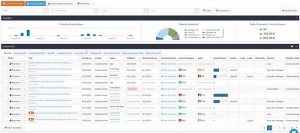With unemployment levels rising and more companies big and small furloughing or laying off employees every week, I’m guessing some of these folks are considering the possibility of “freelancing.”

I put that term in quotes because, personally, I despise it. I’ve never called myself a “freelancer”. I think it cheapens the work I do. I think it makes me look like a tactician. That term takes 15 years off my work experience.
But, I get it’s a term people use and for some, it’s definitely applicable. To each his/her own right?
Larger point: More people are going to attempt to try to pick up some work on the side as we get through this worldwide pandemic–no matter what you want to call it.
I was excited to read a post on PR Daily last week about this exact topic. However, the post left me wanting more. Sure, you should get a EIN and set up the legalities of your business. But, the article didn’t really hit on some of the bigger-picture items you should be thinking about if you’re going to try to work for yourself.
So, I thought I’d share some of my thoughts on this topic. After all, I’ve been getting this question for the last 5-7 years. But, given our existing circumstances, some of my advice would change–a little.
1 – Ask yourself one big question
Are you in this for the long haul? Or, are you “freelancing” as a way to make it through the pandemic. The answer to that question will drive a lot of decisions. For example, if you’re just looking to get through the next year-plus, you may just look for smaller projects here and there. You may not bother setting up a larger brand presence. You may not even bother with a web site (more on that in a minute). But, if you ARE in this for the long haul, I think you think about things differently. You think about some semblance of a business plan. You think about short and long-term goals. You think about product offerings. And, you think about what’s realistic. Start with this question, then go from there.
2 – Reset expectations
If you are going to try this, please keep in mind that you are not doing it under anything remotely resembling normal times. In the best of times, starting your own consultancy is tough. There’s a lot of competition out there. Building something from the ground up is tough! Now layer on a global pandemic and the worst economic calamity since the Great Depression? Yeah, not an easy road. So, set those expectations appropriately. In other words, don’t expect instant success and just assume this is going to be very tough. Set realistic goals–maybe 1-2 clients in the next 3-4 months. Start small, build from there.
3 – Network like your professional life depends on it
I don’t say that flippantly, given the virus. I say it because, professionally, it’s true. Over the last 10+ years, I’ve noticed there are a lot of people in our industry that don’t take networking seriously. Some of those people are going to learn a hard lesson if they’re furloughed or laid off in the coming months. You just can’t start networking when you need something. Networking is an “always-on” proposition. And, if you’re going to try the solo consultant thing, hopefully, you were already doing a fair amount of networking. If you are starting from scratch, see #2 above and adjust even more. Because now the deck is REALLY stacked against you. Regardless, you better start networking like your professional life depends on it. Because, quite frankly, it does.
4 – Focus on being useful–not creating a web site
Here’s the easiest way I can try to explain this strategy. If you create a web site for your business, what is the bulk of that content going to be about? You and your newly founded consultancy, right? Who, exactly, cares about that content right now as you’re starting out? Your Mom, maybe your spouse and your best friend. Three people. Maybe. On the flip side, if you made yourself useful and offered to help friends and colleagues in any number of ways, who would pay attention to those efforts? Virtually everybody. You would win good juju with those you’re helping (read: NEW BUSINESS!). And, people along the way would see what you’re doing (because you’re sharing on social media, of course), and thank you and acknowledge you. If you’re going to be a solo consultant, you do need some kind of online presence, but I would argue right now, in this environment, you’re better served on helping others and being useful before you even think about building that web site.
5 – Determine your niche–don’t go after everything
When you’re working on the agency or corporate sides, there’s a lot of value in being a generalist. You’re a jack or jane-of-all-trades. You can do it all. You save the company money because you can do 2-3 different jobs. It makes sense. But, on the consulting side, it’s the opposite, in my view. It makes more sense to specialize. I’m sure some folks will disagree with me, but I’ve seen far more value in specializing over the years than I have in being a generalist. Clients have specific needs. They want people who can help with those. Plus, as a solo, you’re not an AOR. You can’t possibly meet all of the client’s needs. So, don’t try to. Hone in on 1-2 niches and try to meet that, instead. Remember, you’re not trying to make $ 10M. You’re just trying to make more than you made in your previous job.
6 – Work with non-profits to build your portfolio
Your first hurdle as a solo will be a big one: How do I build up a portfolio of work? If you’re lucky, you’ll score a couple early clients and that work will serve as your professional solo consulting portfolio. But, what if you struggle to get those first clients? Stands to reason that will be the case given the economy, right? In that case, there is one sector that could definitely use your help right now: Non-profits. As you might imagine, they’re struggling right now. Struggling to get donors. Struggling to find volunteers. Struggling with all of it. And, there are two big areas where non-profits are typically week: Digital marketing and PR. Boom! Volunteer to help your favorite non-profit in one of these two areas. 1) You’ll feel so great about helping an organization in need. And 2) You’ll build your porfolio of work you can then use to find real, paying clients. Win-win!
Image by thedarknut from Pixabay
Business & Finance Articles on Business 2 Community
(69)
Report Post




